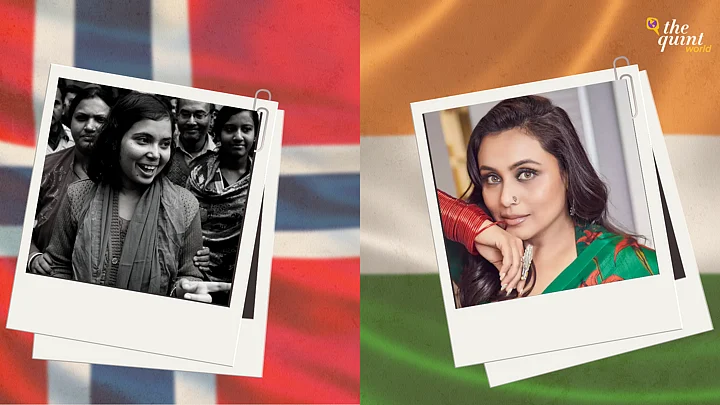The first trailer for Rani Mukherjee’s ‘return to screen’ film ‘Mrs Chatterjee vs Norway,’ was released on Thursday, 23 February and left the internet in awe of her performance in the 3-minute trailer itself.
Mukherjee plays the role of a woman standing up to the Norwegian government to reunite with her children.
The trailer establishes her as Devika Chatterjee, an immigrant Indian mother who lives a perfect life with her husband and two children until her life takes a drastic turn when her children are snatched by Norwegian foster care.
But did you know that the film, which Karan Johar dubbed as “Rani Mukerji’s best performance,” is actually inspired by the decade-old real story of an Indian woman in Norway?
A New Life
In 2007, Sagarika married geophysicist Anurup Bhattacharya and moved to Norway to start their new life together. She would return to Kolkata in 2008 for the birth of the couple's first child, Abhigyan, and would remain in India for a year.
Several media reports said that during their stay in India, Abhigyan began showing “characteristics of autism.” The mother-son duo flew back to Norway in 2009 when the boy was barely 14 months.
As his condition worsened, the couple placed him in a family kindergarten in 2010, and by then, Sagarika had conceived her second child, Aishwarya, making it harder for her to provide complete attention to Abhigyan.
Snatched by Child Services
It was in May 2011 that tragedy struck, when Norwegian Child Welfare Services (CWS) took Abhigyan and Aishwarya away, flagging issues such as parents sleeping in the same bed as children and using their hands to feed the children (which was claimed to be force-feeding).
While Norway does have an extremely strict child protection system and a history of blanket rules for everyone living in the country, the authorities were criticised for their ignorance to Indian culture, where such practices are bedrock.
Sagarika, who was in her late twenties at the time, was branded mentally unfit to take care of her children, got estranged from her husband, and ended up engaging in a two-year-long strenuous legal battle which even saw the Indian government step in.
Authorities accused her of “being disorganised, unpunctual, lacking in structure and unable to establish a proper daily routine for herself or her family,” and ordered that the children will be separated from their parents and placed in a foster home until they attain the age of 18.
While Sagarika’s efforts to argue and reason with the CWS continued to fail and her marriage continued to suffer, the case began to make headlines both in Norway and in India.
Homecoming
As pressure continues to mount pressure, the then External Affairs Minister SM Krishna met his Norwegian counterpart in Oslo to seek a compromise, eventually deciding that the CWS will evaluate the children's paternal uncle, 27-year-old unmarried dentist Arunabhas Bhattacharya, as a potential custody option. Subsequently, it was announced that the childrens' custody will be awarded to the uncle.
During a visit from Secretary (West) Madhusudan Ganapathi to Oslo and Stavanger, he allegedly said that the children's condition was better than when they lived with their parents.
Sagarika’s first taste of win came when the Indian government intervened and the Norwegian court that was handling the case allowed Abhigyan and Aishwarya to return to India under the condition that they would live with their uncle.
But for Sagarika, the battle was far from over. She went ahead and filed a petition with West Bengal’s Burdwan Child Welfare Committee to have the children transferred to her care, alleging that her in-laws had been reluctant to let her near the children and that they were not being looked after.
The claims were seconded by the CWC and eventually, Sagarika was declared psychologically fit to raise her children.
While living with her children at her parent’s house in West Bengal’s Birati, Sagarika enrolled for her master's degree and even penned a book titled 'Journey of a Mother.’
Now, the film, directed by Ashima Chibber, is set to release on 17 March.
"I am happy and excited that this journey of mine has been made into a movie. I hope it will inspire many more parents whose children have been taken away by Barnevernet (Norwegian CWS), to fight back," Sagarika told the Times of India.
(At The Quint, we question everything. Play an active role in shaping our journalism by becoming a member today.)
